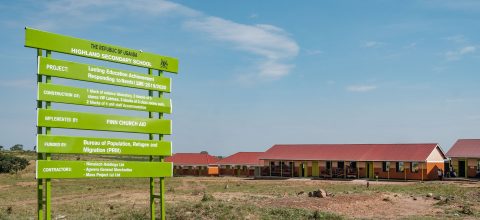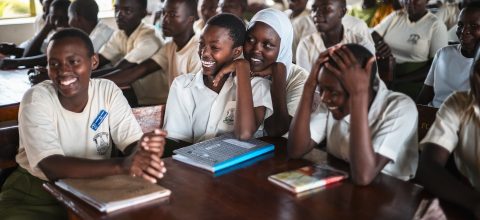“Finns should just stay out of Kenya’s conflicts” – is that so, Alexon Mwasi?
Alexon Mwasi, the Programme Manager of Finn Church Aid’s Kenya Country Office, is a huge fan of kotikalja, a home-brewed non-alcoholic beer popular in Finland. It is also his opinion that Western media presents an incomplete picture of Africa. In our hot seat feature, it is our turn to ask him some tough questions about foreign aid and local work.
The European stereotype is that Africans grow up surrounded by nature and wildlife. Did elephants roam in your backyard when you were a child, Alexon Mwasi?
Applies to me, at least! My family lives next to the Tsavo National Park, so wild animals showing up in our backyard was a common thing. You better believe it was at times terrifying to walk several kilometers to school and back! When we grew up and started hunting antelope, however, this fear quickly turned into rousing fun.
After studying international development cooperation, you have worked in this field since 2004. But has the world become a better place during your career?
A tricky question. It is true that it is not easy for Kenyans to influence climate change and the related challenges, but there are things are better now than back then. The wells we drill are a lifesaver for countless people, for instance, and will be for a long time to come.
Kenya has been in turmoil lately. There are the cattle rustling issues and the related conflicts, as well as protests and political instability. Would you agree with the following statement? “It would be better if Finns did not get involved in Kenyan conflicts at all.”
Partly true. Some local conflicts are so complex that it is hard for outsiders to understand them, let alone find a resolution. On the other hand, outsiders can often help us greatly and offer fresh ideas for solving our problems.
What about these statements? “It is true that foreign aid workers just do a better job than locals.”
Absolutely untrue. Cooperation is the key. Local people and institutions know what is wrong and sometimes have the solutions, but experts from outside bring in a lot of new knowledge. In farming, for example, the locals are usually the best experts on which crop variants grow the best and sell the most. However, external help can still help improve their methods of farming and increase their water-use efficiency.
“It is time for Africans to help each other.”
True enough, but as I said, some problems, like climate change, are plain difficult for Africans to influence. There is no-one less responsible for climate emissions than Africans, but they are still very vulnerable to droughts, for example. There are issues where we need to help ourselves, but also issues where humanity needs to stand together.
“The Western media presents a balanced picture of Africa.”
The ongoing drought is something the Western media has mostly ignored, for example, though this might be because of the war in Ukraine and other major recent events. When it came to the recent protests in Kenya, though, the media was there, portraying them as enormous and violent. One might have been left with the impression that the whole country was burning, though the protests were, in the end, a minor affair.
“The war in Ukraine does not affect lives in East Africa.”
Completely untrue. We are very dependent on Ukraine. The crucial grain and cooking oil imports stopped completely when the war started, accelerating the food crisis and the inflation. Thankfully – and surprisingly – Ukraine managed to negotiate a deal that allowed them to start exporting grain to East Africa again, but the imports are still scarce. As a result, we are suffering.
You recently visited Finland and fell in love with the taste of kotikalja. Is it true that you are now making your own batches in the cleaning closet of FCA’s Nairobi office?
Ha ha! That sure is an interesting idea. I loved the taste of kotikalja! If I had the chance to brew more myself, one or two batches would not be enough.
Text by Björn Udd
Translation by Tatu Ahponen

